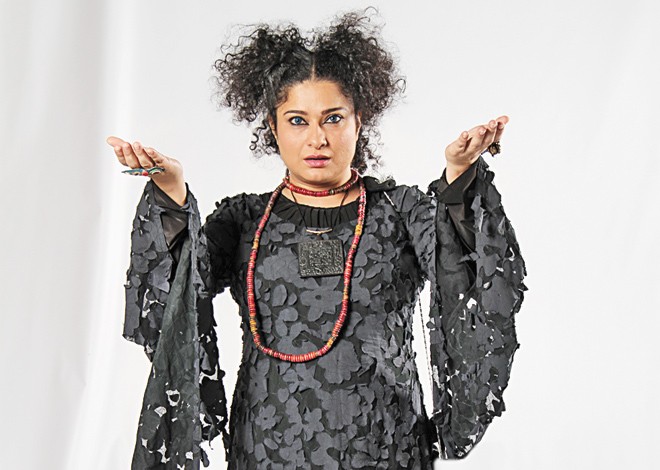
Sania Saeed talks about her unusual role in the upcoming Mor Maha

Sania Saeed needs no introduction. She isn’t only one of the most seasoned actresses in Pakistan, but also a socially aware one. Her work with DASTAK and KATHA are proof of her dedication to intelligent entertainment. But her upcoming role in the upcoming TV series Mor Mahal is perhaps one of the most unusual roles she’s ever played. "This is the weirdest thing I have ever done," says Saeed with a giggle when we sat down to talk.
What is so unusual about her role? She plays a character that has never been envisioned, let alone portrayed on Pakistani television. "I play an oracle." An oracle was someone who offered prophecies delivered from a divine source. Of course, this is an ancient concept because the play is based in an ancient, unspecified time, not any area or region in specific.
An unusual storyline therefore requires special training. "After Aahat, this was the first time that I’m involved in a play where actors had to go through a special acting workshop."
Saeed says that all actors would get together and try to get a grip on how they were going to portray these larger than life, unique characters. "My character is so different from the rest because she doesn’t look, act or dress like any of the other women of this world. I had no restrictions on how to portray her. Also, I didn’t have to wear that heavy jewelry while shooting in the heat either!"
What’s funny in Saeed’s last statement is that most women would kill to get their hands on the elaborate and ornate royal jewelry, but Saeed is not ‘any other woman’. In fact, some of her friends even call her a conspiracy theorist for some of her views but her confidence enables her to speak her mind without fear of a backlash.
"I think it’s not a coincidence that women are portrayed as weak and vulnerable. It’s all very well thought out." There is the age-old debate in Pakistani TV that there are very limited roles for actors (male and female both) to play but it can’t be changed because this is what the masses want. Saeed questions the effect of such TV content, adding that it’s a chain reaction where these shows are making women believe that this is all that a woman is capable of.
"I know so many women who do something about the injustice they face. Whether its acid burn victims or regular women, women are fighting for their rights every day but according to TV, all women are suffering and letting their suffering continue." Saeed says that many times, actors themselves are sitting making fun of their own characters, which they have to portray. "I will be screaming ‘what’s wrong with you woman? Why are you letting this happen to you?’"
Part of the blame goes to writers for not coming up with new content. One would think that because of male patriarchy, men dominate every field and therefore control how women are portrayed. "Patriarchy is working differently here because there are actually very few male writers left (and they are all very good) and most of these drama serials are in fact, being written by women."
Why is this so then? Women should be celebrating women, not tearing them apart. But according to Saeed, this is how patriarchy takes control because these women who are writing dramas usually come from conservative, regressive backgrounds themselves and don’t have access or exposure to powerful, successful women. "Most of these women are either constantly thinking about men, or from their perspective. Their ultimate reward is the acceptance from men." Saeed is so angry now that her voice has risen. "If I try to explain to a woman that your family is not intact if you’re being beaten or psychologically abused, they will argue that religion allows men to beat women so how can we oppose religion." Therefore this ideology spills out into the kind of content that is being created.
Refuting men’s claims that TV is a woman’s medium, Saeed argues "Just because women are getting more screen-time, doesn’t mean that they are the winners. All these dramas are only promoting female suffering. How does this work in our favour?"
Backward stereotypes are used in dramas. "If you are a strong, working woman, your children will be troubled. Your house will be going down in shambles. You will be considered ‘evil’. But if you’re wearing a dupatta on your head, you are suddenly the epitome of piety. If I’m not wearing a dupatta on my head, does that mean I’m not shareef?" Also, the pinnacle of a woman’s success will depend on the return rate of the men in their lives. If your abusive, conniving husband comes back to you, then it’s a win.
Female character’s dependency on the men in their life is common to Pakistani television, but Saeed happily informs us that her character in Mor Mahal is devoid of any such limitations.
"I have no sons, husbands, son-in-laws or any male relatives who my life revolves around. Thankfully, my character is further unique in that way." Saeed’s latest character is free from any physical as well as representational barriers. "I tried to bring something new to the table. My voice, my mannerisms – everything is different."